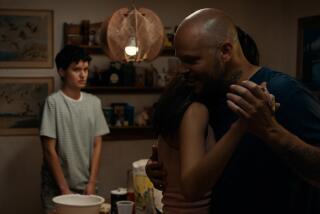MOVIE REVIEW : ‘Children’ a Deeply Emotional Memory-Driven Film
As hard as it is to be a father, being a son can be more difficult still. Well into his 70s, master Swedish filmmaker Ingmar Bergman is still struggling with his personal history, trying to come to terms with the painful, conflicted relationship he had with his father, and exceptional films continue to result.
Though he no longer directs, Bergman has not stopped writing scripts about his family and passing them on to deserving pinch-hitters. He gave the Palme d’Or-winning “Best Intentions” to Bille August, and the director of “Sunday’s Children” is Bergman’s own son Daniel, which makes its father-son theme more poignant. The younger Bergman’s feature debut, it is a remarkable beginning, simple, unhurried, yet deeply emotional.
This is more than a matter of having the best of scripts to work with, which Daniel Bergman does. Only in his early 30s, the younger man avoids missteps and displays the kind of ease with intense material that argues for the inheriting of directorial talent.
Where “Best Intentions” dealt with the courtship and early married years of Bergman’s mismatched parents, “Sunday’s Children” picks the story up in 1926, with 8-year-old Ingmar, nicknamed Pu, occupying an uneasy spot as the middle child of the stern preacher Henrik (Thommy Berggren, the star of “Elvira Madigan”) and his more worldly wife, Karin (Lena Endre).
Set during a summer vacation in rural Sweden, “Sunday’s Children” establishes its theme immediately, with the Bergmans gathering at the train station to welcome the head of the family home after a day spent preaching to the king and queen in Stockholm.
Initially distant, refusing to stand near anyone, young Pu suddenly breaks into a mad run and leaps passionately into his father’s arms. It’s all there in that brief sequence, the separation and mistrust he feels toward his family and the parallel, almost painful need to be loved without reservation.
The only person who can manage that, however, is the family’s unaffected young servant Maj (Maria Bolme). Pu’s mother is a distant figure, his older brother Dag (Jakob Leygraf) is a pitiless tease, and his father, though loving in his own way, is also rigid, unyielding and at the mercy of a hateful temper that is terrifying when unleashed.
Making things more difficult for Pu is that, like his father, he is a Sunday’s child, gifted by tradition with special sight. Young as he is, he sees what others do not, what he is not meant to, picking up emotional currents to which his elders seem oblivious.
That kind of characterization is only as believable as the actor who plays it, and young Henrik Linnros is marvelous at projecting an air of melancholy unexpected in one so small. With sadness and hurt visible in his eyes, Linnros possesses a naturalness that makes you believe he is being, not acting.
“Sunday’s Children” is an episodic, memory-driven film, with the Bergmans presenting a series of vignettes of incidents remembered and influences never forgotten. Many of these, not surprisingly, were troubling to young Pu, including a servant’s reciting of a dark tale of violence, sexuality and suicide. Pu then visits the spot where the story’s subject hanged himself and, in a vision, asks the corpse, “When will I die?” The answer, “Always,” is especially haunting given what we know about who the lad grew up to be.
The most daring aspect of “Sunday’s Children” is its periodic flash-forwards to 1968, some 40 years later, when a glum 50-year-old Ingmar pays back these old scores by pitilessly lecturing his lonely and dying father. It is only now, a quarter of a century later, that the elder Bergman is able to take the tentative steps toward forgiveness that this film represents.
For though it can’t shake its air of sadness, “Sunday’s Children” by no means ends up a dour picture. Director Daniel Bergman has the gift of being able to recapture lost time, especially time as it is viewed through the special lens of childhood, and there are elegiac moments in this film that will stay with you forever. For all its melancholy, this is a world we do not want to leave.
* MPAA rating: Unrated. Times rating: Except for one scene of nudity and a suicide, the film is not explicit, but the nature of its subject matter will not make it of interest to children. ‘Sunday’s Children’
Thommy Berggren: Henrik Bergman
Lena Endre: Karin Bergman
Henrik Linnros: Pu
Jakob Leygraf: Dag
Maria Bolme: Maj
Borje Ahlstedt: Uncle Carl
Per Myrberg: Ingmar
A Sandrew Film & Theatre AB production, released by First Run Features/Castle Hill. Director Daniel Bergman. Producer Katinka Farago. Screenplay Ingmar Bergman. Cinematographer Tony Forsberg. Editor Darek Hodor. Costumes Mona Theresia Forsen. Art director Sven Wichmann. Running time: 1 hour, 58 minutes.
* In limited release at the Music Hall Theater, 9036 Wilshire Blvd., Beverly Hills. (310) 274-6860.
More to Read
Only good movies
Get the Indie Focus newsletter, Mark Olsen's weekly guide to the world of cinema.
You may occasionally receive promotional content from the Los Angeles Times.











